Welcome to Our New Training Centre!
We are thrilled to announce that on 27th May we opened our new Training Centre at Watton at Stone from where we are delivering all our training courses. What is especially exciting is the beautiful building, The Old Methodist Church, which we have lovingly renovated and is situated in a very pleasant village. Just as exciting is that there is even more parking on site as we have our own secure private car park.
Watton at Stone is a lovely village with local shops just a short walk from the centre. At lunchtime we often take our students to the local pub, a great spot to relax and recharge between sessions.
We’re confident that everyone joining us will love the new space just as much as we do. It’s not just a move – it’s a step forward in delivering what we like to call ‘Seriously Cool Training’.
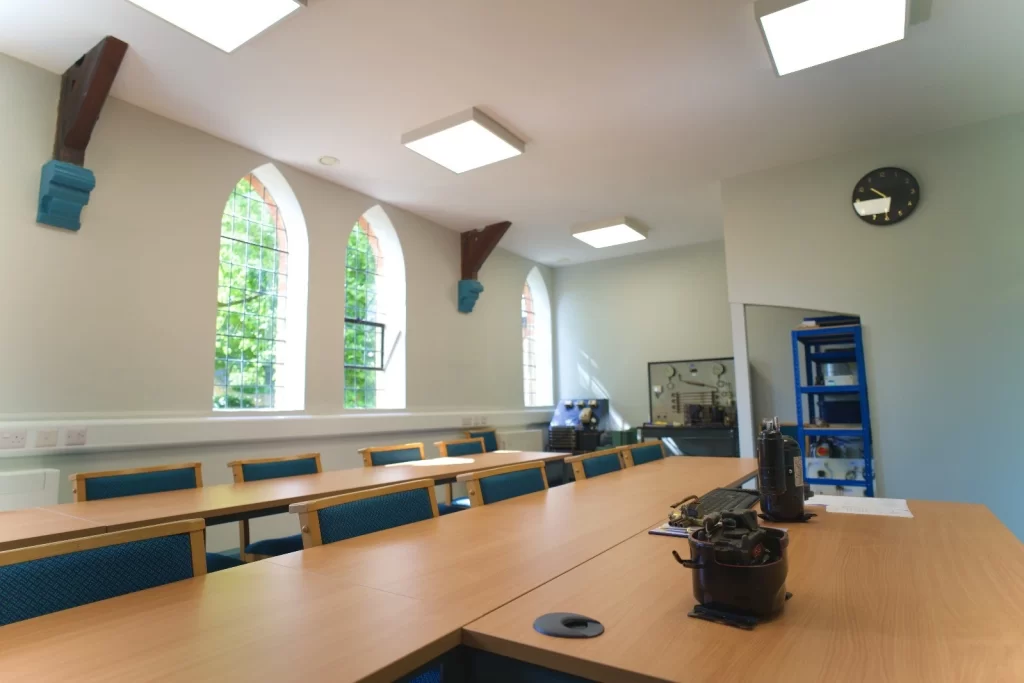
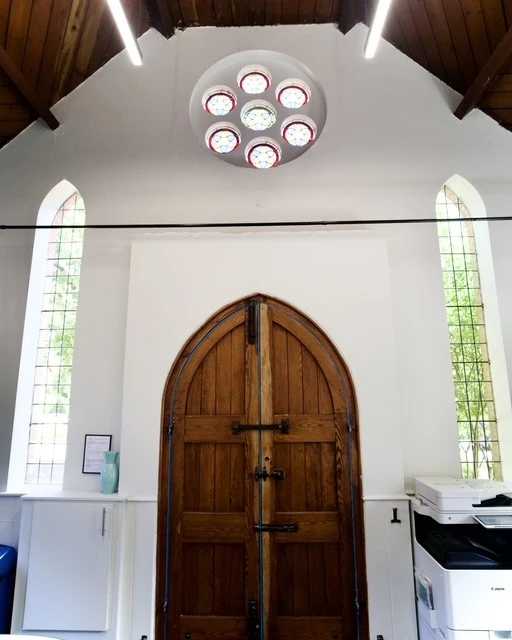

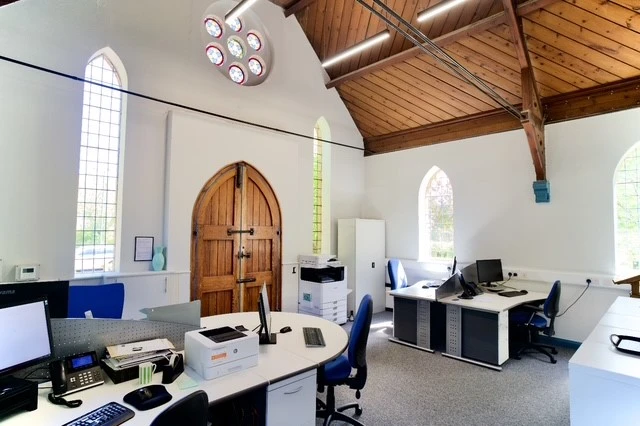
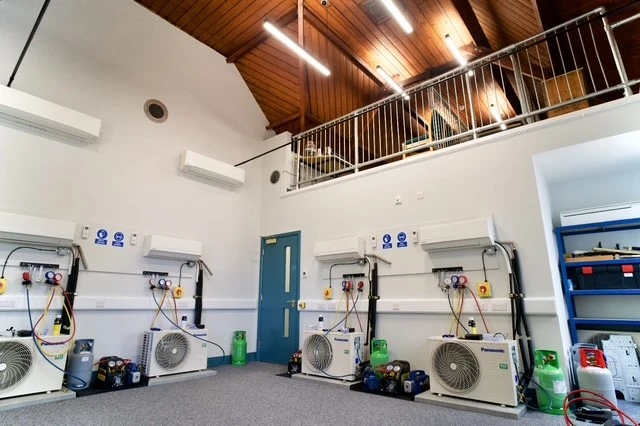
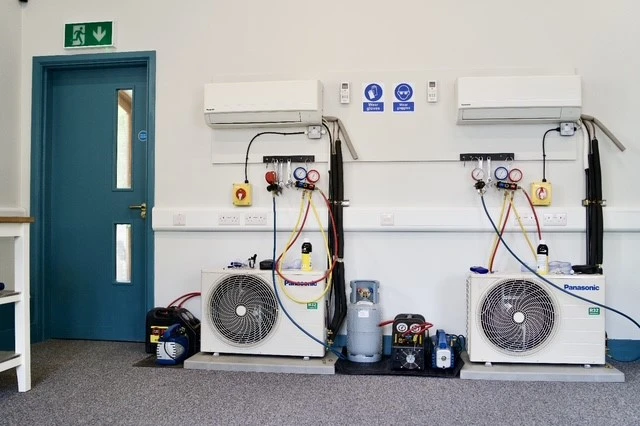

If you’ve got any questions or would like to book a course, give us a call on 01707 879 879.
Heat Pumps vs Heat Pumps?
To explain, there are two types of systems, both run by a refrigeration system so working in the same way but providing different outcomes and therefore used for different applications.
The first, is the air-to-air heat pump, commonly known as split air conditioning (AC) systems which heat in the winter and provide cooling in the summer. Most well known for being used in offices, shops and hotels but just as well suited to houses as they provide the vital cooling required for the hot summer months and also simple to install in any situation.
The second is air to water, these are the systems that are now being promoted to replace gas boilers. They heat the water for the hot tank supplying the domestic supply as well as the radiators/underfloor heating. They don’t provide cooling and are not suitable for all properties.
Both types of system are included as green technologies, and both are gaining momentum as the way forward to heat our homes.
Air-to-Air Heat Pumps
Can be used to completely heat a home in winter and come in various forms, floor standing systems, wall mounted and ceiling vented. They can be installed in most properties, have the advantage of heating to higher temperatures, are very economical to run and can be less complicated to install.
There are no entry requirements for training so open to anyone who has any practical skills.
As this is a refrigeration system an F Gas certificate is a legal requirement for anyone installing one of these systems but that qualification alone would probably not on its own offer enough knowledge to be able to install such systems, however short additional courses are available.
They don’t however provide the domestic hot water but a combination of this with a water heating system can be installed so heating and ventilation of the space, dehumidification and air filtration can all be carried out by this type of system with smart control of individual room temperatures.
See:- Department for Energy Security & Net Zero (EIRO): Air-to-Air Heat Pumps Review
Air-to-Water Heat Pumps
This system replaces the gas boiler and can be air source or ground source. This means an outside system using the air or buried in the ground. Ground source has many limitations due to space and are probably more suited to new builds due to the depth that the pipes need to be buried and most homeowners don’t want their garden dug up!
Air Source systems, using similar to the outdoor unit in the split (AC) system heats the water in the hot water tank and central heating system via the radiators but can involve lots of work to replace radiators, sometimes the pipes running to them and do not heat to the same temperature as current central heating systems so careful design is a requirement.
There are government grants available for appropriate qualified installer of heat pumps. To gain a qualification to obtain the grant candidates must have the prerequisite entry requirement of an NVQ at level 3 in heating, plumbing or oil or documented evidence of suitable manufacturer training and several years experience in conventional heating to be able to enter the course.
As these are non-refrigerant side qualifications, successful candidates cannot install the first type of air conditioning (AC) system without the F Gas qualification and further training.
For more information or if you have any questions, get in touch with us today!
City & Guilds F-Gas Certification: The Facts About Renewal and Expiration
In the refrigeration and air conditioning industry, holding the right qualifications is essential. The City & Guilds F-Gas Certification is widely recognised as the most popular MINIMUM Legal Certification for persons handling fluorinated refrigerants but recent misinformation has led to confusion about its validity. At Ellis Training, we want to clarify the facts: the City & Guilds F-Gas Certification does not expire and does not require renewal.
When the UK F-Gas and ODS Regulations are updated in 2025 it is possible that it mirrors the European F-Gas Regulations coming into force and that addition ‘refresher’ modules may be added to enable people to handle alternative non-fluorinated refrigerants. This will apply to all versions of these qualifications.
Debunking the Myth
Despite some claims from less reputable training providers, there is currently no requirement to renew your City & Guilds F-Gas Certification. This qualification is valid for life, and once you’ve earned it, there’s no expiration date to worry about. The suggestion that it needs to be renewed is false and misleading.
Staying Updated
While the certification itself is permanent, the refrigeration and air conditioning industry is constantly evolving. It’s important to stay current with the latest practices and regulations. At Ellis Training, we offer bespoke refresher courses and advanced training to ensure that your knowledge and skills remain up-to-date. However, these courses are for professional development, not for renewing a certification that doesn’t need it.
Choosing the Right Training Provider
When selecting a training provider, choose one that offers transparent, accurate information. At Ellis Training, we pride ourselves on integrity and quality education. We’re here to support your ongoing professional growth without misleading claims.
Conclusion
The City & Guilds F-Gas Certification is a lifetime qualification—there’s no need for renewal or concerns about expiration. Focus on staying informed and enhancing your skills through continuous learning. If you have any questions or need further training, Ellis Training is here to help you stay ahead in your career.
For more information about our courses and how we can help you stay ahead in the industry, contact Ellis Training today.
Understanding the Basics of Air Conditioning Systems: A Guide for Aspiring Engineers
Understanding the fundamentals of air conditioning systems is important for any aspiring engineer. This guide provides an overview for those entering the field.
What is an Air Conditioning System?
An air conditioning system is designed to regulate the temperature (heating or cooling), humidity and air quality of indoor environments. It works by extracting heat from indoor air and dissipating it outdoors, thereby cooling the space and/or heating the space by reversing the function of the evaporator and condenser. The main components of an air conditioning system include the compressor, condenser, evaporator, expansion device and refrigerant.
How Do Air Conditioning Systems Work?
- Evaporation: The refrigerant absorbs heat from the indoor air via the evaporator coils, causing it to evaporate and transition from a liquid to a vapour.
- Compression: The gaseous refrigerant is compressed by the compressor, increasing its pressure and temperature.
- Condensation: The high-pressure vapour travels to the condenser coils located outside, where it releases the absorbed heat and condenses back into a liquid.
- Expansion: The liquid refrigerant then passes through an expansion device, lowering its pressure and temperature before returning to the evaporator to repeat the cycle.
Types of Air Conditioning Systems
- Central Air Conditioning: Ideal for large buildings, central systems use ductwork to distribute conditioned air evenly throughout the space.
- Split Air Conditioning: Common in residential and small commercial settings, these systems consist of an indoor unit and an outdoor unit, connected by refrigerant lines.
- Window Units: These compact, self-contained units are installed in windows or wall openings and are suitable for cooling single rooms.
- Portable Units: Mobile units that can be moved between rooms, providing flexible cooling solutions.
- Heat Pumps: Most modern systems are Heat Pumps. Split Systems and VRF/VRV systems are ‘air to air’ Heat Pumps. Air Source Heat Pumps are air to water systems, extracting heat from the outside air and using it to heat water for domestic use and/or space heating
Key Components
- Compressor: The heart of the system, responsible for compressing the refrigerant and driving the cooling cycle.
- Condenser: Releases the absorbed heat from the refrigerant into the outdoor air.
- Evaporator: Absorbs heat from the indoor air, causing the refrigerant to evaporate.
- Refrigerant: A chemical compound that cycles through the system, absorbing and releasing heat.
Maintenance and Energy Efficiency
Regular maintenance is essential to ensure the efficient operation and longevity of air conditioning systems. Key maintenance tasks include:
- Filter Replacement: Regularly replacing or cleaning filters to maintain airflow and improve indoor air quality.
- Refrigerant Leak Check: Ensuring refrigerant is contained in the system.
- Component Inspection: Regularly inspecting the compressor, condenser, and evaporator for signs of wear and potential issues.
Energy efficiency is a critical consideration in modern air conditioning systems. Engineers must be knowledgeable about energy-efficient designs and technologies, such as inverter-driven compressors and high SEER (Seasonal Energy Efficiency Ratio) rated systems, which can significantly reduce energy consumption and operational costs.
Choosing the Right System
Selecting the appropriate air conditioning system involves assessing several factors, including:
- Building Size and Layout: Understanding the space to be cooled and the most efficient distribution method.
- Cooling Load: Calculating the cooling requirements based on factors such as occupancy, insulation, and local climate.
- Energy Efficiency: Opting for systems with high energy efficiency ratings to reduce environmental impact and operational costs.
Conclusion
As a future air conditioning engineer, understanding the basics of air conditioning systems is a fundamental step in your career. From understanding the key components and their functions to recognising the importance of maintenance and energy efficiency, this knowledge will equip you to design, install, and maintain effective air conditioning solutions.
Ellis Training offers air conditioning courses to deepen your understanding and hands-on experience in air conditioning systems, preparing you for a successful career in the industry.
Latest Trends in Air Conditioning Technology
The air conditioning industry is changing, driven by technological advancements and a heightened focus on environmental sustainability. Here, we delve into the latest trends in air conditioning technology that are set to define the future of this industry.
Smart Thermostats and IoT Integration
Smart thermostats have revolutionised the management of indoor climates. By leveraging the Internet of Things (IoT), these devices offer more control and convenience. Users can manage their air conditioning systems remotely using smartphones, tablets, or computers, ensuring comfort and energy efficiency no matter where they are. The integration of air conditioning systems with other smart home devices has made controlling the climate within homes easier than ever before.
One of the standout features of smart thermostats is their ability to learn user preferences over time. These devices use algorithms to analyse patterns in temperature settings and adjust automatically for optimal comfort. For instance, if a thermostat detects that the user prefers cooler temperatures in the evening, it will adjust the settings accordingly without manual input.
Geofencing is another innovative feature, which uses the user’s location to adjust the temperature. When the user is detected within a certain radius of their home, the system can begin cooling or heating, ensuring the perfect indoor climate upon arrival. Additionally, integration with voice-activated assistants like Alexa and Google Home further enhances user convenience, allowing for hands-free control of the air conditioning system.
Integration with Building Management Systems (BMS)
The integration of air conditioning systems with Building Management Systems (BMS) is becoming increasingly common. BMS provides centralised control and monitoring of various building systems, including air conditioning, lighting, and security. This integration allows for more efficient management of energy use and maintenance schedules. The increasing demand for air conditioning engineers to manage and maintain these integrated systems is a testament to the evolving technology in this field.
BMS can analyse data from air conditioning systems to identify inefficiencies and recommend improvements. For instance, it can detect when a component is operating below optimal performance and schedule preventive maintenance before a failure occurs. This proactive approach not only enhances system reliability but also extends the lifespan of the equipment.
Energy Efficiency and Eco-Friendly Refrigerants
Sustainability is a primary focus in today’s HVAC industry. The push for energy efficiency is not only about reducing energy bills but also about minimising the environmental impact. One significant advancement is inverter technology, which allows compressors to operate at variable speeds rather than a fixed speed. This capability leads to substantial energy savings, as the system can adjust its power usage based on the cooling demand.
Eco-friendly refrigerants are also gaining traction. Traditional refrigerants like R-410A are being phased out in favour of options with lower Global Warming Potential (GWP). Refrigerants such as R-32 and R-454B offer similar performance but with a significantly reduced environmental footprint. These changes are driven by global regulations aimed at curbing greenhouse gas emissions and promoting sustainable practices. Additionally, these advancements are reducing energy consumption, further contributing to environmental sustainability.
Advanced Air Filtration and Purification
Indoor air quality has become a critical concern, especially in urban environments where pollution levels are high. To address this issue, modern air conditioning systems are incorporating advanced air filtration and purification technologies. These systems are designed to remove pollutants, allergens, and pathogens, ensuring a healthier indoor environment. Additionally, ductless systems can improve indoor air quality by eliminating dust and allergen buildup.
High-Efficiency Particulate Air (HEPA) filters are commonly used to capture fine particles, including dust, pollen, and smoke. Ultraviolet (UV) light systems are also employed to neutralise bacteria and viruses, adding an extra layer of protection. Photocatalytic oxidation, another innovative method, uses UV light to activate a catalyst that breaks down harmful organic compounds, further purifying the air.
Solar-Powered Air Conditioning
As renewable energy sources become more accessible, solar-powered air conditioning systems are emerging as a viable alternative to traditional units. These systems use photovoltaic panels to generate electricity, which powers the air conditioning units. The primary benefit is a reduction in reliance on grid electricity, leading to lower energy costs and a reduced carbon footprint.
Hybrid systems that combine solar power with conventional electricity are also being developed. These systems ensure consistent performance even when solar energy is insufficient, such as during cloudy days or at night. By integrating solar power, air conditioning systems can operate more sustainably while maintaining reliability.
Modular and Scalable Systems
Modern buildings often require flexible HVAC solutions that can adapt to changing needs. Modular and scalable air conditioning systems are designed to grow with the building’s requirements. These systems can be easily expanded or reconfigured to accommodate changes in building use or layout. Heat pumps can be integrated into these systems to provide both heating and cooling, enhancing their flexibility.
This flexibility is particularly valuable in commercial and industrial settings where space utilisation can change frequently. For instance, a building that undergoes renovations or changes its layout can adjust its HVAC system without the need for a complete overhaul. Modular systems offer the ability to add or remove units as needed, ensuring efficient climate control regardless of the building’s configuration.
Heat Recovery Systems
Heat recovery systems are gaining popularity as a means to enhance energy efficiency in HVAC designs. These systems capture waste heat generated by air conditioning or refrigeration processes and repurpose it for heating or hot water. This approach not only reduces energy consumption but also lowers operating costs.
In a typical setup, the waste heat from an air conditioning system is transferred to a heat exchanger, which then uses the heat to warm air or water. This process maximises energy utilisation by ensuring that no energy is wasted. Heat recovery systems are particularly beneficial in commercial and industrial applications where large amounts of waste heat are generated.
Artificial Intelligence and Predictive Maintenance
Artificial Intelligence (AI) is making significant inroads into the air conditioning industry, particularly in the areas of system performance and maintenance. AI algorithms can analyse data from HVAC systems to predict potential failures before they occur. This predictive maintenance approach allows for timely interventions, reducing downtime and preventing costly repairs.
AI can also optimise system performance by analysing usage patterns and adjusting settings for maximum efficiency. For example, AI can determine the most efficient times to run the air conditioning based on occupancy patterns and external weather conditions. By continuously learning and adapting, AI enhances the overall efficiency and reliability of HVAC systems.
Conclusion
The air conditioning industry is evolving, from smart thermostats and IoT integration to eco-friendly refrigerants and AI-driven maintenance. Subscribe to the Ellis Training email newsletter to receive information that enables you to stay ahead of industry changes and to keep you up to date with our courses.
The changes to F-Gas regulations
Landmark Reforms in EU HVACR Legislation: Revised F-Gas
Regulation and EPBD Approval
The European Union has reinforced its commitment to tackling climate change with significant reforms in refrigeration and building energy performance. On March 11, the revised F-Gas Regulation came into effect, marking a new era in the management of fluorinated gases across the EU. Concurrently, the European Council and European Parliament approved substantial revisions to the Energy Performance of Buildings Directive (EPBD). Together, these legislative changes aim to reduce greenhouse gas emissions drastically and advance the EU’s journey towards climate neutrality.
Revised F-Gas Regulation: A Comprehensive Overview
Objectives and Scope
The updated F-Gas Regulation, officially designated as EC2024/573, intensifies efforts to minimise the use of hydrofluorocarbons (HFCs) and other fluorinated gases in various refrigeration, air conditioning, and heat pump (RACHP) applications. Building on earlier successes, the new legislation aims to phase out HFCs entirely by 2050. This ambitious target is crucial for meeting the EU’s 2030 climate objectives and achieving climate neutrality by 2050.
Key Measures and Timelines
The regulation outlines a detailed schedule for reducing the availability of f-gases. Starting from January 2025, there will be a gradual reduction in quotas, with stricter phasedowns and service bans implemented throughout the 2020s and 2030s. A significant change includes the requirement from 2032 that any f-gas refrigerant with a Global Warming Potential (GWP) above 750 used for service and maintenance must be reclaimed or recycled, eliminating the use of new refrigerants.
Impact on the HVACR Sector
The Institute of Refrigeration Ireland (IRI) has noted that the updated regulation will significantly impact the HVACR sector. The stricter phasedowns will necessitate a rapid shift towards non-fluorinated refrigerants. This transition will challenge the industry, particularly in terms of finding suitable alternatives and ensuring that all stakeholders are well-informed about the new regulations. Existing systems containing f-gases can continue to operate, but the availability of these refrigerants for maintenance will be heavily restricted.
Specific Measures for Chiller Systems
Chiller systems, essential for commercial and industrial refrigeration, are subject to particular attention in the new regulation. From 2027, chillers smaller than 12kW must use refrigerants with a GWP below 150, while larger chillers must meet a GWP limit of 750. By 2032, chillers below 12kW will no longer be permitted to use any f-gases, driving the industry towards more sustainable refrigerants.
Exemptions and Safety Considerations
The final legislation includes various exemptions, particularly where safety concerns might limit the use of alternative refrigerants in certain buildings. Clarifications on these exemptions and how they will be applied are expected to provide the necessary guidance for the industry to adapt smoothly.
Energy Performance of Buildings Directive (EPBD) Approval
Goals and Implementation
The revisions to the EPBD represent a significant stride towards decarbonising the EU’s building sector. By 2040, all heating and cooling systems in new and existing buildings must be fossil fuel-free. This directive underscores the EU’s dedication to reducing the environmental impact of buildings, which are a major source of greenhouse gas emissions.
Implications for the Building Sector
The EPBD revisions will have wide-reaching implications for the construction and HVACR industries. Builders, designers, and contractors will need to adopt new technologies and practices to comply with the fossil fuel-free mandate. This will likely drive innovation in energy-efficient and renewable energy technologies, fostering a more sustainable construction industry.
UK’s Position and Future Directions
Post-Brexit Regulatory Landscape
While the EU moves forward with its revised F-Gas Regulation, the UK is independently reviewing its f-gas legislation. Following Brexit, the UK retained the EU’s 517/2014 regulation but now has the opportunity to develop its own approach tailored to its specific climate goals. The UK government has reiterated its commitment to mitigating climate change, with an emphasis on addressing the unique needs and opportunities within the UK market.
Industry and Government Dialogue
The UK HVACR industry is actively engaging with the government to influence the development of new regulations. Industry leaders are pressing for a pragmatic approach that balances the need for harmonisation with the EU regulations and the UK’s ambitious climate targets. The outcome of this dialogue will shape the future regulatory landscape for refrigerants in the UK.
Certification and Training: What You Need to Know
Impact on F-Gas Certifications
Despite the extensive EU changes introduced by the revised F-Gas Regulation, there is currently no impact on existing F-Gas certifications in the UK. Engineers who have completed an Ellis Training course remain fully certified under the new regulations. The comprehensive training provided by Ellis Training ensures that all certified individuals are well-equipped to handle the ongoing requirements and challenges in the HVACR industry.
Staying Updated
Given the dynamic nature of regulatory changes, staying informed is crucial. Ellis Training offers an email newsletter to keep professionals up-to-date with the latest developments in F-Gas regulations and other industry news. Subscribers will receive timely updates, ensuring they remain compliant and informed about best practices and new legislative requirements.
Click here to subscribe to the Ellis Training newsletter and stay ahead of future changes.
Conclusion
The enactment of the revised F-Gas Regulation and the EPBD revisions marks a significant advancement in the EU’s climate policy, driving substantial reductions in greenhouse gas emissions and pushing the HVACR and building sectors towards greater sustainability. Despite these changes in the EU, the UK has not yet made any alterations to its f-gas legislation, and existing certifications remain valid. The collaborative efforts of regulators, manufacturers, and service providers will be crucial for a smooth transition to a more sustainable future.
For more information and to stay updated with the latest changes in F-Gas regulations, subscribe to the Ellis Training newsletter.
How to Become an Air Conditioning Technician
Are you looking to start a career in the Air Conditioning industry? With the average salary of a qualified and experienced air conditioning technician being in the range of £35,000 to £42,000 and the demand for energy-efficient air conditioning rapidly increasing in the UK due to the country’s commitment to reducing carbon emissions, it is the perfect time to start a career as an air conditioning technician. Read on to find out how to become an air conditioning technician.
Understanding the Role
Before delving into the technical aspects of the job, it’s important to understand what it entails to be an air conditioning technician. You will be responsible for ensuring that indoor environments remain comfortable and safe through the installation, maintenance, and repair of air conditioning systems. From domestic cooling units to complex commercial HVAC systems, their work directly impacts the well-being and productivity of occupants.
To gain insights into the profession, consider contacting experienced technicians, they will often be willing to provide advice or even work experience. This first-hand experience will provide valuable insights into the day-to-day duties, challenges, and rewards of working in the field. Additionally, exploring online resources, industry publications, and forums can help you stay informed about current trends and developments in the HVAC industry.
Refrigeration Training
Consider enrolling in a vocational training program focused on air conditioning systems. These programs are available at Ellis Training Works. Our training courses cover:
- Refrigeration Principles: Understanding the principles of refrigeration is fundamental to working with both heating and air conditioning systems. Training in this area typically covers topics such as heat transfer, pressure-temperature relationships, and refrigerant properties.
- System Installation: Learning how to install various types of split air conditioning systems. This training includes understanding system components, electrical testing, and proper installation techniques.
- Maintenance and Troubleshooting: Training in maintenance procedures, including regular inspections, cleaning, and lubrication of system components. Additionally, learning how to diagnose and troubleshoot common issues such as compressor failure, refrigerant leaks, and airflow problems.
- Environmental Regulations: Understanding environmental regulations related to refrigerants and their safe handling and disposal. This includes knowledge of regulations such as the UK F-Gas Regulation which governs the use of fluorinated gases in refrigeration, air conditioning and heat pump systems.
Refrigeration Certification
To become an air conditioning technician, you will need to complete the F-GAS certification. This is a legal requirement and a certification that Ellis Training Works provides. Obtaining industry-recognised certifications can enhance your credentials as an air conditioning technician. Organisations such as City & Guilds offer certification programs that validate your skills and knowledge in air conditioning systems. Additionally, manufacturers often offer product-specific certifications for their equipment.
Consider pursuing certifications in areas such as refrigerant handling, system installation, and maintenance procedures. These certifications not only demonstrate your competency to employers but also ensure that you adhere to industry standards and regulations. Additionally, staying updated on changes in legislation and technological advancements is essential for compliance and staying competitive in the field.
Continuing Professional Development
The air conditioning industry is constantly evolving, with new technologies and regulations shaping the way air conditioning systems are designed, installed, and maintained. To stay ahead of the curve, invest in continuous professional development by attending workshops, seminars, and industry conferences. Keep abreast of emerging trends, energy-efficient solutions, and sustainable practices that are driving innovation in the field.
Networking with fellow professionals and joining industry associations can also provide valuable opportunities for learning and growth. Engage with online communities, participate in discussions, and share your experiences with others in the industry. By actively seeking out opportunities for learning and development, you can ensure that you remain a knowledgeable and skilled air conditioning technician throughout the course of your career.
Start Your Journey in Becoming an Air Conditioning Technician
Becoming an air conditioning technician in the UK requires a combination of education, practical experience, and ongoing professional development. By following these steps and investing in your training and qualifications, you can embark on a rewarding career in the air conditioning industry. Whether you’re installing cooling systems in homes or maintaining complex commercial air conditioning systems, your expertise will be essential in ensuring comfort and efficiency for occupants. Embrace the challenges and opportunities that come your way, and continue to learn and grow as you establish yourself as a trusted professional in the field.
Book onto one of our courses today and start your journey as an air conditioning technician.
What is F-Gas Certification?
Fluorinated Gases (F-Gases) have long been recognised as significant contributors to global warming and ozone depletion. To mitigate their impact, regulatory bodies have instituted F-Gas certification. This certification ensures that individuals involved in handling, maintaining, or disposing of F-Gases are proficient in safe and environmentally responsible practices.
Ellis Training Works offers City & Guilds courses tailored to F-Gas certification requirements. These courses cover essential topics such as regulations, leak detection, recovery techniques, and disposal methods. By completing these courses, professionals gain the knowledge and skills necessary to comply with regulations and effectively manage F-Gases.
Importance of F-Gas Certification
F-Gas certification is the legal minimum requirement in the UK for working on refrigeration, air conditioning and heat pump systems containing Fluorinated gases.
Ellis Training Works provide participants with practical insights into the latest industry standards and best practices. This knowledge equips them to minimise F-Gas emissions, enhance system efficiency, and ensure the safety of both personnel and the environment. Moreover, F-Gas certification enhances professional credibility and opens doors to lucrative career opportunities in the industry.
F-Gas Courses
Here at Ellis Training Works, we offer a 5-day City & Guilds F-Gas course (2079) and certification which does not expire. The course is suitable for new entrants to the industry and covers everything you need to know about installing, servicing, and leak checking systems.
Participants in our F-Gas courses receive training from highly experienced instructors. Through a combination of theoretical learning and practical exercises, they acquire the skills necessary to handle F-Gases safely. Additionally, the certification carries industry-wide recognition, enhancing the credibility and marketability of certified professionals.
Enhanced Safety
Safety is paramount when working with F-Gases, which can pose significant risks if mishandled. F-Gas certification equips professionals with the expertise to implement robust safety protocols, minimising the likelihood of accidents and ensuring the well-being of personnel and the surrounding environment. The City & Guilds F-Gas course (2079) emphasise the importance of safety measures and provide practical insights into risk management strategies.
By undergoing F-Gas certification training, individuals learn to identify potential hazards, implement preventive measures, and respond effectively to emergencies. This approach to safety promotes a culture of awareness and preparedness within organisations, reducing downtime and liability associated with accidents.
F-Gas Efficiency and Wastage
Efficient management of F-gases is essential for environmental sustainability, system performance optimisation, and operational cost reduction. F-Gas courses delve into techniques for minimising F-gas usage, optimising system efficiency, and extending equipment lifespan. By implementing these strategies, businesses can achieve significant cost savings while simultaneously reducing their carbon footprint.
Professionals certified through F-Gas courses are equipped with the expertise to identify opportunities for system optimisation and implement targeted interventions. This proactive approach enhances operational efficiency and strengthens the competitive edge of businesses in an increasingly sustainability-conscious market.
Sustainability and Excellence
F-Gas certification represent a commitment to sustainability, excellence, and regulatory compliance. By acquiring the knowledge and skills necessary to handle F-Gases responsibly, professionals play a crucial role in mitigating climate change impacts and safeguarding the environment. Through our F-Gas courses, individuals can embark on a journey towards a greener, safer, and more prosperous future for themselves and the planet.
Career Advancement Opportunities
F-Gas certification opens doors to various career advancement opportunities within the refrigeration, air conditioning, and heat pump industries. Employers value professionals with the expertise to handle F-Gases safely and responsibly, making F-Gas certification a valuable asset for career progression. The City & Guilds certification we provide is recognised for its high standards and enhances the employability of certified professionals.
Take a look at our F-Gas courses and book in today!
Women in Refrigeration
During the same week that we celebrated International Women’s Day (8th March) we were honoured to have two women join us for their F Gas qualification.
While they were by no means the first women to come through our doors to complete their training, like buses two came at once! It was purely coincidental that they both chose to come on the same course but it was good to see them.
Well done to both and here’s wishing you all the best for future success in this vibrant exciting industry.

29/01/46 – 22/03/2022
We lost a dear friend and colleague of 50 years yesterday. Mike Pinch was dearly loved by us and his students alike whose number are numerous. Thanks to his expertise they have had a wonderful start in this industry to which he added so much, in so many ways.
Goodbye Dear Man.

Welcome All!
This week sees our second group of F Gas students and our 15 day delegates in centre. It feels great to be back and doing what we love and meeting so many great guys. With our rigorous COVID regime in place, everyone is safe in the knowledge that they can train without worrying. See you soon!
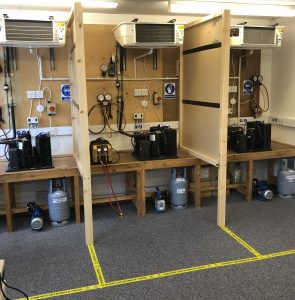
30th Birthday Today!!
🎉🎉🎉🎉🎉🎉🎉🎉🎉🎉🎉🎉🎉🎉🎉
We are proud to be celebrating our 30th Birthday today! 🎉 We are also looking forward to welcoming new team members, new courses and new students in 2021! Excited about an epic year ahead!!
Happy New Year all! 🎉
Welcome to Our New Training Centre!
We are thrilled to announce that on 27th May we opened our new Training Centre at Watton at Stone from where we are delivering all our training courses. What is…
Read More
Heat Pumps vs Heat Pumps?
To explain, there are two types of systems, both run by a refrigeration system so working in the same way but providing different outcomes and therefore used for different applications….
Read More
City & Guilds F-Gas Certification: The Facts About Renewal and Expiration
In the refrigeration and air conditioning industry, holding the right qualifications is essential. The City & Guilds F-Gas Certification is widely recognised as the most popular MINIMUM Legal Certification for…
Read More
Understanding the Basics of Air Conditioning Systems: A Guide for Aspiring Engineers
Understanding the fundamentals of air conditioning systems is important for any aspiring engineer. This guide provides an overview for those entering the field. What is an Air Conditioning System? An…
Read More
Latest Trends in Air Conditioning Technology
The air conditioning industry is changing, driven by technological advancements and a heightened focus on environmental sustainability. Here, we delve into the latest trends in air conditioning technology that are…
Read More
The changes to F-Gas regulations
Landmark Reforms in EU HVACR Legislation: Revised F-Gas Regulation and EPBD Approval The European Union has reinforced its commitment to tackling climate change with significant reforms in refrigeration and building…
Read More
How to Become an Air Conditioning Technician
Are you looking to start a career in the Air Conditioning industry? With the average salary of a qualified and experienced air conditioning technician being in the range of £35,000…
Read More
What is F-Gas Certification?
Fluorinated Gases (F-Gases) have long been recognised as significant contributors to global warming and ozone depletion. To mitigate their impact, regulatory bodies have instituted F-Gas certification. This certification ensures that…
Read More
Women in Refrigeration
During the same week that we celebrated International Women’s Day (8th March) we were honoured to have two women join us for their F Gas qualification. While they were…
Read More
29/01/46 – 22/03/2022
We lost a dear friend and colleague of 50 years yesterday. Mike Pinch was dearly loved by us and his students alike whose number are numerous. Thanks to…
Read More
Welcome All!
This week sees our second group of F Gas students and our 15 day delegates in centre. It feels great to be back and doing what we love and meeting…
Read More
30th Birthday Today!!
🎉🎉🎉🎉🎉🎉🎉🎉🎉🎉🎉🎉🎉🎉🎉 We are proud to be celebrating our 30th Birthday today! 🎉 We are also looking forward to welcoming new team members, new courses and new students in 2021! Excited…
Read More

